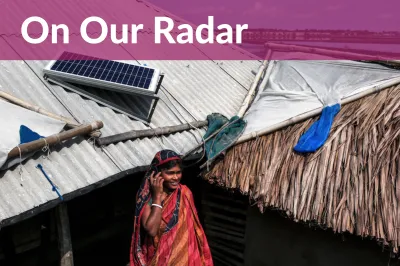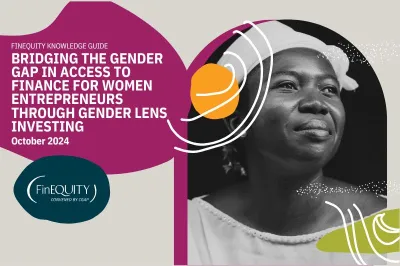Reflecting Forward: A Focus on Thoughtful and Deliberate Digitally-Enabled Financial Inclusion for Women in 2021

FinEquity’s new learning agenda, developed by drawing on engagement with our membership base and deep-dive consultations with leading research and programmatic stakeholders, is organized around three main learning themes: Gender Transformative Solutions, Digitally-Enabled Financial Inclusion, and Impact Pathways. This is the third post in our series on FinEquity’s new learning themes, launched in 2020.
In this post, FinEquity’s Thematic Lead for Digitally-Enabled Financial Inclusion (DEFI) Catherine Highet introduces the work plan for the coming year focusing on sub-themes that assess some of the challenges of DEFI and considers thoughtful approaches to better enable the meaningful use of digital financial services.
Digital Financial Services – what’s holding women back?
The last decade saw an increasing fervor around the potential of digital technologies to achieve pretty much anything. The year 2020 only increased expectations that you could just add digital technologies to achieve the financial inclusion required during a global pandemic. Yet, we saw the knowledge and usage gaps more clearly than ever before – despite the promise of remittances, those excluded were even more so when the COVID-19 pandemic limited our abilities to get mobile money accounts to the women who needed them most. This reality underscored the issues around women’s financial inclusion and the global emergency, and instead of expediting access to financial services, it has acted as a separate significant barrier.
Top of the agenda – our key priorities for the Digitally-Enabled Financial Inclusion theme in 2021
Engagement with FinEquity has grown significantly over the last 12 months and this rich dialogue has informed the following DEFI’s subthemes for 2021:
• Understanding and addressing unique barriers associated with DFS - such as digital financial literacy (DFL) and its enablers.
• DFS design for women - ensuring that the wants, needs, and realities of women are appropriately considered and addressed across the adoption and usage lifecycle.
• Understanding and unpacking the DFS-specific normative barriers and their impact on adoption and usage of DFS for women.
What’s driving these subthemes? The learning questions we hope to answer in 2021
Our first subtheme focuses on Digital Financial Literacy (DFL). In 2020, FinEquity hosted a fruitful discussion on DFL, looking at the factors that enable it – literacy, numeracy, social norms, design, access, and consumer awareness. Drawing on more than 80 contributions, the next step is to synthesize these findings in a knowledge product, asking sub-questions, such as: What challenges does digital financial literacy (DFL) pose to financial inclusion? How do the different enablers of DFL intersect with each other? We want this knowledge product to be practical and to distinguish tactical solutions to addressing DFL (designing tools, existing solutions that can be repurposed) from strategic solutions (policy and social norms changes).
Be on the lookout for a call for case studies in February on this subject, we want to hear from you and profile your work!
A second subtheme, which emerged from the DFL conversation, was the role of design in women’s adoption and usage of DFS. Not just how payments apps look, but how we need to think about and design the entire customer journey for women – what tools, processes, and skills do we need to enable good design? We have a wealth of experience within the FinEquity community and this subtheme will showcase key examples of where design has improved uptake and usage of DFS among women across marketing strategies, devices, training, user interfaces. As we will see, thoughtful design is an intrinsic part of every stage of the customer journey.
We also want to consider what is driving design and how we ensure that we are creating useful tools for the users, and not designs based on assumptions. Too often, product and service design places the onus on learning and adopting DFS on the client, with the belief that “if we build it, they will come”, pushing ill-fitting products or services. To this end, we are also going to look at “less-is-more" and other heuristic approaches to DFS and women’s financial inclusion, and what can we learn from them through a webinar set to take place over the summer.
Our third and final subtheme, gendered social norms and DEFI, will look at the way that gendered social norms do not so much impact DEFI but overlay the entirety of the user journey and experience. We want to formulate key questions, looking at which normative barriers exist on the demand/supply side for DFS as well as expectation setting around the amount of time it takes to change norms, for both donors and practitioners. This work will also draw on our 2020 conversation around myths and assumptions in women’s use of DFS. Alongside our Gender-Transformative Solutions Lead Nisha Singh, we will explore just how pervasive and influential norms are to women’s use of DFS, through blogs, DGroups conversations, and webinars.
We are excited to kick off this work and learning agenda with you, thinking about how DEFI can improve women’s lives – moving from access, to usage, to impact. Over the course of 2021, we will hold quarterly conversations to keep you up to date with the process as well as providing further opportunities for engagement in the DEFI work plan.
We are counting on your interest and engagement in Digitally-Enabled Financial Inclusion to drive our agenda forward. Which parts of this would you like to contribute to or collaborate on? Reach out over one of our platforms or contact me directly at chighet@worldbank.org. We would love to hear your thoughts.


